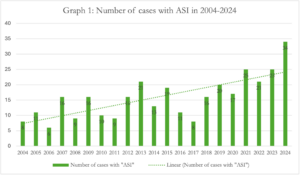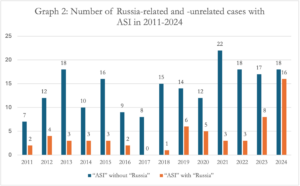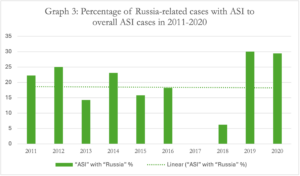Anti-suit injunction (“ASI”) cases have risen in number in the United Kingdom (“U.K.”) over the last two decades. Sanctions imposed by various States, including the European Union (“EU”) and the U.K., have been in place against Russia for about half of this period in light of its invasion of Ukraine and the on-going Russia-Ukraine war (see a complete timeline of the EU’s sanctions against Russia and the one of the U.K.’s sanctions against Russia since February 2022), contributing to a proliferation of arbitration proceedings between Russian entities and their contractual partners. Efforts by Russian parties to obtain relief from Russian courts in such cases (see discussion here and here) have prompted counterparties to file for ASI before English courts (see here and here). This post relies on a statistical analysis of the ASI cases in the U.K. to explore whether a causal relationship exists between the imposition of sanctions on Russia and the rise in the ASI cases in the U.K.
Methodology
The authors collected data on the number of such cases from the Westlaw case database for the period from 1 January 2004 to 31 December 2024. Two sets of keywords were used: “anti-suit injunction” and “anti-suit injunction” + “Russia.”
The data showed a general upward trend in the number of the ASI cases in the U.K. between 2004 and 2024, as shown in the following chart.

The linear diagram in the graph above represents the data points for each year on a curve to enable a meaningful interpretation. It shows an upward trend in a number of ASI cases per year.
Data from 2011 to 2024 was then analyzed to understand whether the rise in ASI cases in the U.K. is connected with Russian sanctions. The results were analyzed for the following two subsets of time:
First, 1 January 2011 to 31 December 2020: this period was analyzed to test the effect of sanctions imposed on Russia by various States in 2014 following Russia’s annexation of Crimea and occupation of parts of the Donbas and Lugansk regions. The period from 2011–2013 was included to compare the pre-sanction period with the sanction period.
Second, 1 January 2019 to 31 December 2024: this period was analyzed to test the effect of sanctions imposed on Russia by various States following the full-scale invasion of Ukraine by Russia. The period from 2019–2022 was included to compare the pre-2022-sanctions period with the post-2022-sanctions period.
The numerical year-wise results are represented in the following chart:

For each period, a “probability value” or P-value analysis was conducted on the hypothesis that the rise in ASI cases was caused by Russian sanctions. The P-value is a statistical tool which indicates the likelihood that the data being analyzed occurred by chance. The lower the P-value, the less likely it is that the results occurred by chance—indicating a higher probability of causation between the two variables.
A further analysis of the search results was conducted by using “sanction” as an additional search term and/or reviewing the cases themselves to check if sanctions-related grounds were present.
Results
The absolute numbers for the period from 2014 to 2020 showed a slow parallel growth in the ASI cases including those containing a reference to the term “Russia” and those without. About one quarter of the total number of ASI cases during this period contained the keyword “Russia.”

The linear diagram in the graph above shows that the trend of “anti-suit injunction” + “Russia” as a proportion of total ASI cases remained more or less steady from 2011 to 2020, indicating similar growth in both categories of cases.
However, the P-value analysis did not support the hypothesis that the Russian sanctions were a factor which led to the increase in ASI cases. This was further confirmed by an additional search of the results with “sanction” as a keyword, which led to only one hit, unrelated to the Russian sanctions.
For the period between 24 February 2022 to 31 December 2024, about one third of the ASI cases contained the keyword “Russia” as well. While the size of the dataset was insufficient to draw any statistical conclusion on causation, there was a noticeable increase in the ASI cases containing the keyword “Russia” after 2022, with the largest number of such cases in 2024.

The polynomial line demonstrates the trend in Russia-related ASI cases as a percentage of total ASI cases over 2019–2024. It shows that the overall trend was inconsistent though the proportion of such cases increased from 2022 onwards.
A review of these cases revealed that in approximately 74% of the cases, Russian sanctions were an underlying factor for parties seeking an ASI.
Analysis
The statistical analysis detailed above indicates an inconsistent relationship between the Russian sanctions and the growth of ASI cases in the U.K. While the 2014 Russian sanctions do not appear to have caused an increase in ASI cases, the 2022 Russian sanctions may be linked to the rise in such cases.
One factor explaining the inconsistency may be the increase in the number and types of sanctions introduced after the full-scale invasion of Ukraine in February 2022. In addition, it would be remiss not to consider the impact of Articles 248.1 and 248.2 of the Russian Commercial Procedural Code which were enacted in June 2020. Article 248.1 (3) grants Russian commercial courts exclusive jurisdiction over disputes where the proceedings involve a sanctioned person and/or where the dispute itself arises from sanctions imposed on Russian entities or individuals, including in cases where a valid arbitration agreement exists between the parties. Indeed, approximately 33% of cases in the sample between 2022 and 2024 containing the keywords “anti-suit injunction” and “Russia” included a discussion on Article 248.1 as well. Article 248.2 allows Russian courts to issue an ASI to stop foreign proceedings. The introduction of this provision may, therefore, be a factor contributing to the rise in Russia-related anti-suit injunction cases during the period from 2022 to 2024 as compared to the period from 2014 to 2021.
Two developments in 2024 and 2025 may further impact the number of Russia-related ASI cases in the U.K. in the future. First, Article 11(c) of the new EU sanctions package introduced in December 2024 bars the EU Member States from recognizing or enforcing Russian court decisions issued under Article 248 and from giving effect to penalties imposed for violations of such decisions. In theory, this may reduce or nullify the utility of the ASI for non-Russian parties seeking to arbitrate in the EU, given that Russian court decisions under Article 248 which nullify the effect of arbitration agreements would already be ineffective in the EU.
Second, the judgment dated 11 February 2025 of the English Court of Appeal in Unicredit v RusChem, where the Court reversed an ASI granted by it in 2024 at the behest of Unicredit (i.e., the non-Russian party) which was threatened with heavy court-imposed monetary penalties in Russia if it failed to get the ASI vacated. In this case, Article 11(c) of the new EU sanctions package could not have benefitted Unicredit as it had assets in Russia against which the penalty could have been enforced by the Russian authorities. At least two other parties in a nearly identical situation have also applied to English courts to vacate previously granted ASIs (see Unicredit v RusChem, para. 8).
These developments shed significant light on the practical utility of ASI, or perhaps an increasing lack thereof, for non-Russian parties, particularly those with assets and in Russia. Their impact on the overall number of ASI cases in the U.K. remains to be seen.
An initial version of this research was presented at the GAR Live London conference in October 2024.
________________________
To make sure you do not miss out on regular updates from the Kluwer Arbitration Blog, please subscribe here. To submit a proposal for a blog post, please consult our Editorial Guidelines.



A very interesting analysis indeed. Are the numbers for cases or decisions (e.g. there may be a number of decisions dealing with the same case and addressing modifications to the injunction etc)?